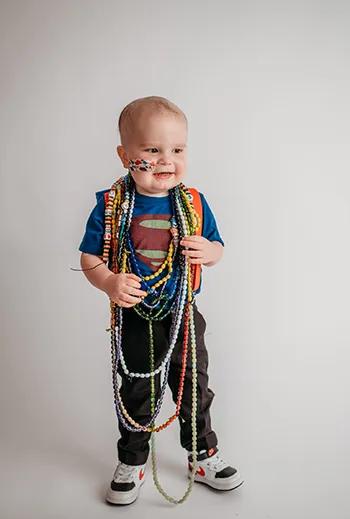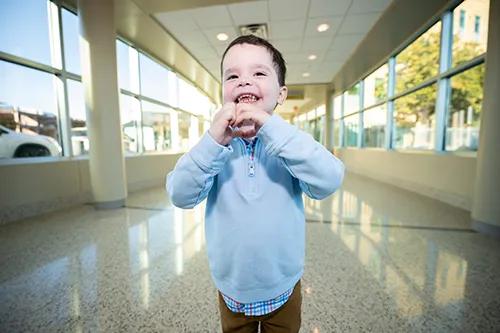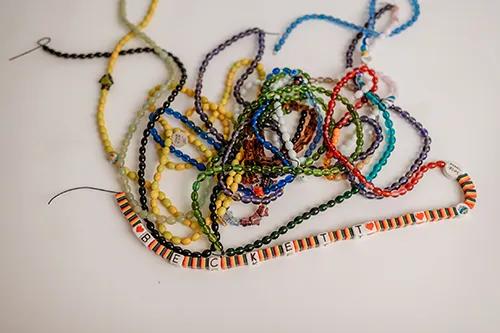
Meet Beckett, who found courage during his cancer journey
Beckett’s family held onto hope when he was diagnosed with a rare and complex cancer at 19 months old. Now, he’s 4 and taking the world by storm.
James describes his 4-year-old son Beckett as an old soul. Some of Beckett’s favorite toys are highly practical: A kid-sized leaf-blower. A plastic lawnmower. Three different toy vacuum cleaners. He’s one of the sweetest kids you’ll ever meet — and one of the most courageous.
Beckett’s family, like many pediatric cancer families, can measure his courage in a way you might not expect: with a string of beads. Through a program called Beads of Courage![]() , children with serious illnesses add beads to their string at important milestones and moments of bravery like needle pokes, hospital stays and treatments completed.
, children with serious illnesses add beads to their string at important milestones and moments of bravery like needle pokes, hospital stays and treatments completed.

“Early on, Beckett’s string was as tall as him. Then it could wrap around him four or five times,” James said. “Now it's this massive, 25-yard-long string of Beads of Courage.”
A life-changing diagnosis
James remembers October 5, 2022, clear as day. It started at the pediatrician’s office, where the doctor ordered blood tests because Beckett, then 19 months old, had an unexplained and persistent fever. It ended at the Pauline Allen Gill Center for Pediatric Cancers and Blood Disorders. James can still picture the physician explaining to him and his wife Megan that Beckett had cancer.
“Could the results be wrong?” Megan asked hopefully.
But the physician hadn’t just taken the results the lab provided — the doctor closely reviewed the bloodwork and knew it was correct.
A rare and complex type of leukemia
Further testing revealed that Beckett had a rare subtype of the most common childhood cancer, acute lymphoblastic leukemia. Called Philadelphia chromosome-positive acute lymphoblastic leukemia (Ph+ALL), it forms because of a genetic change where two genes fuse together.
It was Oct. 9 when Megan and James learned that this type of cancer can pass through the blood-brain barrier and enter the brain and spinal cord – and Beckett had cancer cells surrounding his brain and the tissue near his eyes.
“We lived at Children’s Medical Center Dallas for the first 50 days because he needed such aggressive treatment,” James said.
Beckett had several rounds of chemotherapy, some of which needed to be injected directly into his spine (spinal taps).
“That first year was the worst. He was very, very sick,” James said. “We were lucky to get to spend some time at home. But there were days where we’d be sitting on our couch one minute, and the next he’d have a 105-degree fever, and we’d rush back to the hospital.”
Beckett ultimately needed more than 50 spinal taps over the course of two years, 20 imaging studies and 300 needle pokes. At one point, Beckett required a surgery that relied on experts from oncology, pulmonology, gastroenterology and ear, nose and throat. All told, Beckett spent 131 nights in the hospital before his fourth birthday.

The family was thankful to have Tamra Slone, M.D., Pediatric Hematologist/Oncologist and Kathleen Ludwig, M.D., Pediatric Hematologist/Oncologist at Children’s Health, by their side.
“Dr. Slone was with us during the scariest week of Beckett’s care as this guiding hand who was able to explain everything that was happening,” James said. “And Dr. Ludwig, our primary provider, goes about her job with grace and empathy. She can distill really complicated information and give you some level of optimism, which you really need when your kid is that sick.”
Immunotherapy provides new hope
About eight months after Beckett was diagnosed, everyone breathed a sigh of relief: A scan revealed that there were no more cancer cells in his head and face regions. He would still need many more months of chemotherapy treatment, but this was a good sign.
The family found even more hope when new research came out during his treatment showing that adding a new immunotherapy drug called Blinatumomab could raise the 5-year survival rates for the cancer Beckett had from around 85% to about 96%.
Given the complexity of Beckett’s disease, Dr. Ludwig was quick to add Blinatumomab to Beckett’s care plan.
“We were elated,” James said. “And so thankful that Children’s Health is active in research and an early adopter of next-generation treatments that work very well and have fewer side effects than chemotherapy.”
Doing what 4-year-olds should do
These days, Beckett is in the final phases of his maintenance care, which aims to remove any lingering traces of cancer cells and keep them from coming back. Every Tuesday, he goes to the hospital, gets a poke and some medicine, and then plays in the park with his sister, Brooklyn.
“He has this incredible resilience where he can go through his treatment, sometimes for seven hours a day, and then just run around and play on the swing set when it’s done,” James said.

Beckett is getting stronger every day and meeting his childhood milestones. He’s loving a neighborhood sports program where he gets to try soccer, T-ball and flag football. “My hope for Beckett is more days at the park with his sister and more days playing sports,” James said. “I hope that he gets to thrive and experience life as it should be, not life that revolves around going to the hospital.” James has this hope not only for Beckett, but for all children who develop cancer. Only about four percent of government funding for cancer research goes to childhood cancers. The need for additional research funding is great, and donors play a crucial role in making life-changing research happen. For parents like James and Megan, having care informed by the latest research, close to home, makes all the difference. “Being in a state-of-the-art institution where they use the best technology, the best resources and the latest research helps you, as a parent, know you’re doing everything you possibly can,” James said. “And knowing that your child is getting the best care available — there’s nothing more important.”
Meet more Children's Health patients
Read more patient stories like Beckett's and meet our Patient Ambassadors to learn how Children's Health makes life better for children.
How you can help
Help kids like Beckett by exploring our ways to give or by giving today!
Kids count on us. We count on you.
Give to support innovative research, lifesaving treatments and compassionate care.
Did you enjoy this story?
If you would like to receive an email when new stories like this one are posted to our website, please complete the form below. We won't share your information, and you can unsubscribe any time.

